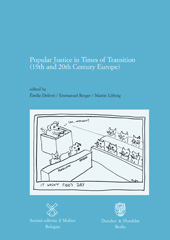Popular justice in times of transition : 19th and 20th Century Europe
218 p.
Includes bibliographical references and index.
It is common to regard the evolution of justice as a civilizing process (Max Weber, Norbert Elias). Popular justice had its part in the process: uncontrolled emotions, which found expression in different kinds of popular justice, would become more and more restrained in the modern state, until complete disappearance. Be it in the form of popular denunciations (Rüge), popular rituals (charivari, rough music, Haberfeldtreiben, or ducking), or even as participation in public executions, the violence of the crowd, the irrationality of subjective feelings, all these forms of behavior typical of lynch justice, slowly had to give place to the impersonal operation of law, the rational formation of a measured and vengeance-less justice becoming the ideal of a "democratization" of citizens' feelings, fostering revulsion against open violence and pain. [Testo dell'editore].
487373 characters.
Collected essays.
This title is not available for purchase in Italy
-
Information



 EPUB
EPUB